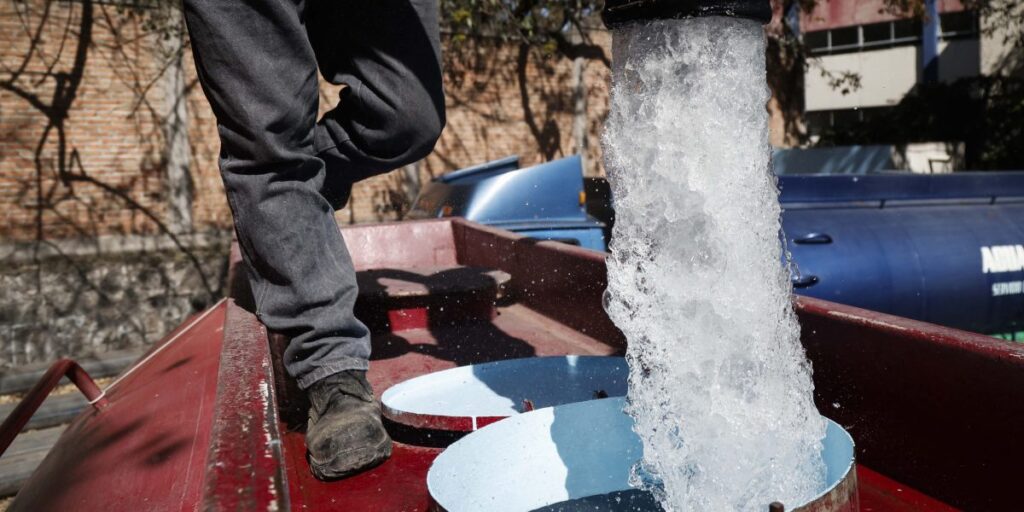Most major cities around the world are past “day zero,” the predicted date when their water supplies will run dry. Currently, one in four people in the world lacks access to safe drinking water, and four billion people live in water-stressed areas, a number predicted to rise to five billion by 2050.
This issue does not discriminate. Many people around the world are already facing water stress, which will get worse as water scarcity increases. It is affecting communities from the Middle East and North Africa to parts of the U.S., including Texas, California, Florida, Arizona, Colorado and Oklahoma.
Water scarcity not only fuels insecurity and migration, but also disproportionately impacts women and puts them at risk of insecurity. Urbanization, climate change and population growth are increasing pressure on available resources, creating the challenge of supporting all 8 billion people with 0.5 percent of the planet’s available water. This is a global challenge on an unprecedented scale, where breakthrough innovation is not only necessary, but essential.
Urgent Needs Require Bold New Solutions
Humanity’s current water supply is 98% derived from groundwater sources and 1% from desalination. Underground aquifers are drying out due to overpumping, which could lead to significant reductions in well water volumes. The oceans contain approximately 96% of the Earth’s water, but current desalination solutions are too expensive and unsustainable to meet the world’s growing demand for freshwater.
Desalination is a mature and established industry. However, there have been no major technological advances in desalination since the early 2000s. Reverse osmosis (RO) has been the benchmark for efficient desalination but has reached its limits and opportunities for innovation are increasingly limited.
Unfortunately, current desalination technologies are not sustainable and primarily run on fossil fuels and water treatment materials that impact the environment. Additionally, water withdrawal and brine discharge (the disposal of a mixture of water and salt into open waters) causes significant damage to fragile marine ecosystems.
The numbers make the need for more reliable, sustainable, and affordable desalination solutions even more clear. Currently, 16,876 desalination plants in 177 countries produce enough desalinated water to support up to 972 million people per day, representing just 1% of the world’s clean water supply. Yet, by 2030, 40% of the world’s clean water demand is expected to go unmet. Desalination is primarily limited to those who can afford it: Desalination accounts for just 1% of global water use, and 71% of desalination plants operate in high-income countries.
Encourage innovators from around the world to compete to solve this grand challenge
As the need to address the water scarcity crisis around the world grows with urgency, the brightest minds are putting all their efforts into finding solutions to ensure a better future for future generations. Joining the fight against water scarcity are international organizations and government agencies such as the United Nations and the World Wildlife Fund. These groups have developed frameworks and water conservation methods that work to save the planet. I have a lot of respect for them and other like-minded organizations in their work for a better future.
I believe competitions can bring out people’s best talents and brightest ideas. At the XPRIZE Foundation, our mission is to solve humanity’s grand challenges through impactful international competitions. The five-year Global Water Scarcity Competition, run in partnership with title sponsor Mohamed bin Zayed Water Initiative, will award $119 million to teams of innovators who can create sustainable, equitable and affordable desalination solutions to advance reliable and widespread access to clean water. It also prioritizes improving environmental sustainability across energy and membrane materials and minimizing harm to marine life.
Water is essential for life on Earth, and water scarcity affects us all. It takes a village of initiatives like ours to build a better future with reliable, sustainable, and affordable desalination solutions that increase universal access to clean water so all of humanity can thrive. But with the world’s best and brightest minds stepping up, we are hopeful that affordable, reliable, and sustainable desalination solutions will be available in the near future.
More must-read articles from Fortune:
Opinions expressed in commentary articles on Fortune.com are solely those of their authors and do not necessarily reflect the opinions or beliefs of Fortune.
Recommended Newsletters: CEO Daily provides essential context for the news business leaders need to know. More than 125,000 readers trust CEO Daily every weekday morning for insight on and from the C-level. Subscribe now.
Source link

